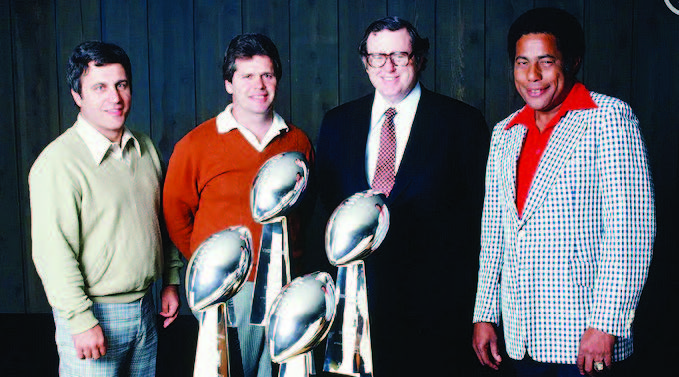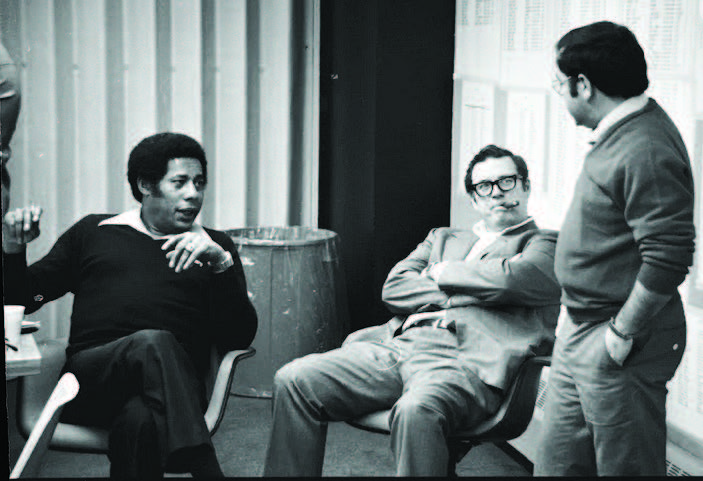Famed Courier sportswriter and editor who introduced players from Black colleges to Steelers as team scout finally elected to Hall as contributor
by Aubrey Bruce
For New Pittsburgh Courier
As I write this article, I am certain that there is a celebration going on in the afterlife.
I am sure that one of the first events that Mrs. Patricia Rooney scheduled when she recently arrived at the banquet “hall of eternity” was to put on a heavenly Hall of Fame banquet inviting many family members and friends to partake in the festivities.
Among the honored guests of the get-together were her father-in-law, Art Rooney Sr., as well as his son, her late-husband, Dan Rooney; Chuck Noll, the jockey that rode the Steelers’ horses of victory to first-place finishes in the Steelers’ legendary Super Bowl victories of the ‘70s; and last, but certainly not least, the super scout horse-trader with a keen eye for talent, Bill Nunn Jr.
With the announcement made on Saturday, Feb. 6, Nunn has now taken his seat at the Pittsburgh Steelers’ “dinner table of eternity.”
Bill Nunn’s induction into the Hall of Fame as a contributor has henceforth promoted and rescued him from the “kids’ ‘table.”
With his induction, Nunn is now dining on heaven’s version of a filet mignon entrée, topped off with chocolate mousse for dessert and a glass of Dom Perignon, as opposed to having to stomach a kids’ meal consisting of kielbasa sandwiches, with s’mores and a cup of Kool-Aid to wash it all down.

BILL NUNN, right, played a very important role in the Steelers’ four Super Bowl wins in the ‘70s. No one knew the talented players from the Black colleges like Nunn, who became a full-time scout for the Steelers in 1969, and brought those talented players to Pittsburgh. (PHOTOS COURTESY PITTSBURGH STEELERS)
Let’s be real here. In 1969, if it weren’t for the vision and needs of Steelers owner Dan Rooney, there would be no Pro Football Hall of Fame for Bill Nunn.
Yet, had it not been for Nunn bringing the Steelers fresh and hungry players from historically Black colleges that helped transform the franchise from the swamp of losing, who knows…maybe Art Rooney Sr. and son Dan, after decades of losing, would have shopped around and shipped the team on a snowy and frost-filled evening to a destination unknown…regardless of the cost.

BILL NUNN, left, strategizing with Steelers management. Nunn introduced a wealth of players from Black colleges to play for the Steelers organization.
The visions and needs of Dan Rooney and Bill Nunn Jr. were permanently interwoven into a historical, armor-like fabric. The result of that union produced an almost indestructible material that would eventually be tailored into a garment that would clothe a future dynasty that had been left for dead, naked and shivering out in the open, braving the freezing elements of ineptitude, suffering through the hypothermia of losing. The Pittsburgh Steelers now had the opportunity to come in out of the cold. They were enthusiastically welcomed into a comfortable abode: experiencing the warmth of a crackling fireplace fueled by the tinder of the prospect of winning. The organization was now eagerly absorbing the newfound warmth and energy that success and victory provided.
Bill Nunn Jr. was born on Sept. 30, 1924, in Pittsburgh, to Maybelle and Bill Nunn Sr. Bill Nunn Jr. graduated from Westinghouse High School, and was a formidable basketball player at West Virginia State University, just outside Charleston. Bill Nunn Jr. then returned to Pittsburgh, where he joined his father at the Pittsburgh Courier, where his father, Bill Nunn Sr., was managing editor.
During his earlier career as a sportswriter and, later, managing editor for the Courier, the wealth of information and insight possessed by Bill Nunn Jr. regarding Black players hailing out of HBCUs was welcomed by the Steelers. The Courier was known for its highlighting of Black football players from Black colleges, when many “White” colleges would overlook them. Nunn was instrumental in the Courier’s HBCU All-America team, and hosting the annual banquet in Pittsburgh for those players.
Twice did Nunn place Art Shell on his All-America team in the ‘60s. Shell was an outstanding offensive lineman at a Black college that was then called Maryland State College (now University of Maryland Eastern Shore). Shell was eventually drafted in the third round by the Oakland Raiders and went on to become a Hall-of-Famer and the first Black NFL head coach in the modern era (the second overall), as head coach of the Raiders.
BILL NUNN (PHOTOS COURTESY PITTSBURGH STEELERS)
Nunn even highlighted Ed Tomlin, father of current Steelers head coach Mike Tomlin. Ed Tomlin played collegiately at Hampton Institute (now Hampton University) in the mid-’60s. Ed Tomlin was drafted by the Baltimore Colts in 1968.
“My first day on the job, Nunn walks up to me and says, ‘I know you. Your dad was on my All-American team in ’67,’” Mike Tomlin said to ESPN’s The Undefeated in a 2014 article. “That shows you the impact of Bill Nunn, not only in terms of the scouting, but creating a mechanism of recognition for these players.
“These guys, they wanted to be on that Pittsburgh Courier Black All-American team, and get invited to that banquet in Pittsburgh, because they knew that meant they were on the radar and they would have an opportunity to pursue their dreams.”
In 1967, Nunn filled a part-time scouting position with the Steelers and was hired full-time in 1969, the same year that Noll was hired as the team’s head coach.
It was Nunn who scouted Black collegiate standouts like receiver John Stallworth, defensive back Mel Blount, safeties Donnie Shell and Glen Edwards, and defensive linemen L.C. Greenwood, Dwight White and Ernie Holmes, and brought them to Pittsburgh. You know the rest. Teaming up with those such as “Mean” Joe Greene, Terry Bradshaw, Franco Harris, Lynn Swann, Jack Ham and Jack Lambert, the Steelers became the team of the decade, winning four Super Bowls in the ‘70s.
It would have never happened if not for Bill Nunn Jr.
In 1987, Nunn “supposedly” retired but continued to scout for the team, reverting back to his part-time status until falling ill at the Steelers’ team facilities just days before his death on May 6, 2014, from complications of a stroke. At the time of his passing, Nunn was survived by his wife, Frances; son, Bill Nunn III; and daughter, Lynell. Today, Lynell is the lone surviving member of the group. Nunn’s granddaughter, Cydney Nunn, is a public relations and marketing professional in Pittsburgh.
Let’s go back to 1967. When Nunn filled the position of part-time scout offered by the Steelers, many of the top-tier White universities did not even accept applications from Blacks. Those actions made it impossible to even consider admitting persons of color into their institutions of learning, therefore overtly excluding the participation of Blacks as students or athletes.
Why was there even a need for a Bill Nunn Jr.? Well, there have been theories offered by many historians (including yours truly) that the integration of the NFL was not simply based on color, but part of a complex layer comprised of economics and the marketing acumen of an NFL ownership group that was collectively focused on a Eurocentric business model and a demographic that had far more spending power and more disposable income than Blacks. The need for Black fans was, at best, optional and possibly regarded as a necessary evil, creating and maintaining a life-with-or-without-them scenario that was OK as far the NFL was concerned. Another factor in the mix was the possible desire to limit the interaction between Blacks and Whites that would assure that the cultural worlds and socio-economic positions of the two distinctly different racial entities remained just that—separate and unequal. The union between Dan Rooney and Bill Nunn Jr. represented far more than professional football. The alliance between them created gale force winds of social change that helped cast to the wind the tumbleweeds of racially dividing and ethnicity-challenging issues.
THE LEGENDARY BILL NUNN JR., officially elected to the Pro Football Hall of Fame on Feb. 6, 2021.
Without Bill Nunn, there would be no “one for the thumb” and no six Lombardi trophies residing at the Steelers’ sports complex. Without Dan Rooney, there are serious doubts that the formation and ratification of the “Rooney Rule” or any other NFL racial equity standard operating procedures would be in place in the league today.
In 1963, the Pro Football Hall of Fame established a place in the Hall for non-player contributors to the game. Bill Nunn Jr. is the first Black “contributor” to be inducted into the Pro Football Hall of Fame, 53 years since the category honoring contributors was created. Why did Bill Nunn Jr. have to wait so long to receive his just due? Why did he have to be posthumously recognized and honored? Why couldn’t he smell his roses while he was still alive to enjoy them?
Many contributors were alive and able to select speakers to present them and help usher them into the halls of immortality. As we ride out the COVID-19 pandemic, I represent one of the many loyal disciples of William Goldwyn Nunn Jr. God willing, I, along with all of the others that he has mentored, will smell his roses for him.
This August, Nunn and the other members of the Pro Football Hall of Fame Class of 2021 will be honored in Canton, Ohio. But, in all candor, there is only one way to truly honor the feats of Bill Nunn Jr.; those that follow in his footsteps must be tireless in duplicating his accomplishments and focusing on those who are often overlooked. Then, and only then, will America and Black America truly honor the great legacy of Bill Nunn Jr.